General Questions
What is a heat pump?
A heat pump is a highly efficient heating and cooling system that transfers heat rather than generating it. In cooling mode, it removes heat from your home and transfers it outside. In heating mode, it extracts heat from the outside air (even in cold temperatures) and amplifies it as it transfers it inside the home.
Why choose a heat pump for my Ontario/Webster, NY home?
- Energy Efficiency: Significantly reduce energy consumption and lower your utility bills.
- Eco-Friendly: Reduce your carbon footprint by using electricity instead of fossil fuels.
- Year-Round Comfort: Provides both heating and cooling for year-round comfort.
- Quiet Operation: Often quieter than traditional HVAC systems.
What types of heat pumps does Green Guys Mechanical install?
We specialize in installing high-quality cold climate air-source heat pumps, including the most energy-efficient models available. Leading with the Fujitsu line of air source heat pumps and the Geostar line of ground source heat pumps.
Air Source Heat Pump Questions
How do air-source heat pumps work in the winter?
Even in cold temperatures, the outside air contains heat. Air-source heat pumps use a refrigerant to extract this heat and transfer it indoors. The Fujitsu line of air source heat pumps are rated down to -15 F outdoor temperatures whereas most other brands are rated down to -13 F.
Are air-source heat pumps suitable for the Ontario/Webster, NY climate?
Yes, absolutely! We offer a selection of air-source heat pumps specifically designed for colder climates to ensure reliable performance even in harsh winters.
Can Green Guys Mechanical help me choose the right air-source heat pump?
Yes! Our experienced technicians will assess your home's specific needs and recommend the most suitable and energy-efficient air-source heat pump for your property.
What is an air source heat pump?
An air source heat pump is a highly efficient heating and cooling system that transfers heat rather than generating it. It works by moving heat from one place to another, similar to a refrigerator.
- Cooling Mode: In cooling mode, it extracts heat from the air inside your home and releases it outside.
- Heating Mode: In heating mode, it extracts heat from the outside air (even in cold temperatures) and transfers it inside your home.
How do air source heat pumps compare to traditional HVAC systems?
- Energy Efficiency: Air source heat pumps are generally more energy-efficient than traditional systems like furnaces and air conditioners, leading to lower energy bills. If your home is on fuel oil or propane for heat, an air source heat pump can cost half what those fuels cost a year to heat your home.
- Environmental Friendliness: They use electricity instead of fossil fuels, reducing your carbon footprint.
- Year-Round Comfort: They provide both heating and cooling, making them a versatile solution for year-round climate control.
Are air source heat pumps suitable for all climates?
While air source heat pumps can operate in a wide range of climates, their efficiency can decline in extremely cold temperatures. This is why we use the Fujitsu line of cold climate heat pumps because they have the best performance ratings at colder temperatures. Our area of the country very rarely gets below -15 F for prolonged periods of time.
- Cold Climate Models: For colder climates, specialized "cold climate" heat pumps are available with features like variable speed compressors and larger heat exchangers to maintain performance in colder temperatures.
What are the benefits of installing an air source heat pump?
- Reduced Energy Costs: Lower energy bills due to high efficiency.
- Increased Comfort: Consistent temperature control throughout the year.
- Environmental Benefits: Reduced carbon footprint.
- Quiet Operation: Often quieter than traditional HVAC systems.
What should I consider before installing an air source heat pump?
- Climate: Assess your local climate to determine if an air source heat pump is a suitable option.
- Home Size and Insulation: Consider the size of your home and its insulation levels to ensure proper sizing and efficient operation.
- Professional Installation: Proper installation by a qualified HVAC technician is crucial for optimal performance and efficiency.
Cold Climate Heat Pump Questions
What are cold climate heat pumps?
Cold climate heat pumps are specially designed air source heat pumps that are engineered to operate efficiently in colder climates.
How do cold climate heat pumps differ from standard air source heat pumps?
- Advanced Technology: They incorporate advanced technologies like:
- Variable Speed Compressors: Adjust their output based on demand, improving efficiency in cold weather.
- Larger Heat Exchangers: Increase the surface area for heat transfer, allowing them to extract more heat from the air even in low temperatures.
- Improved Defrost Cycles: Minimize performance loss during defrost cycles, which are necessary to remove ice buildup on the outdoor unit.
Are cold climate heat pumps more expensive than standard air source heat pumps?
Yes, they generally have a higher initial cost due to their advanced technology.
However, the long-term savings from increased efficiency can offset the higher upfront investment.
What are the benefits of choosing a cold climate heat pump?
- Reliable Heating in Cold Weather: Maintain consistent and efficient heating even in the coldest winter months.
- Improved Efficiency: Optimized performance in low temperatures leads to lower energy bills.
- Increased Comfort: Enjoy consistent and comfortable temperatures throughout the year.
Should I consider a cold climate heat pump for my home?
If you live in a region with cold winters, a cold climate heat pump can be a worthwhile investment. Especially if your home is currently using propane or fuel oil as your primary heat source.
Consult with a Professional: Contact a qualified HVAC contractor to assess your specific needs and determine if a cold climate heat pump is the right choice for your home.






